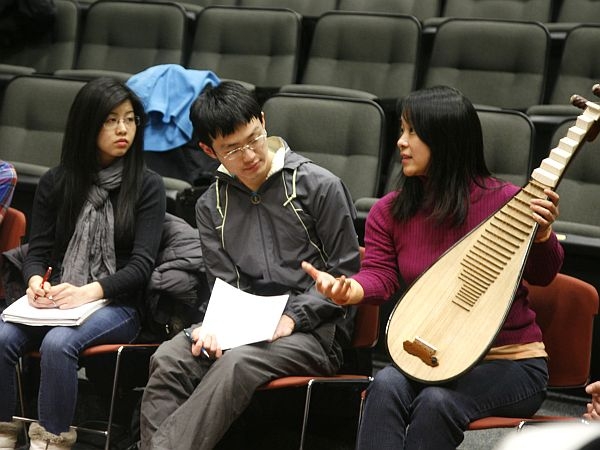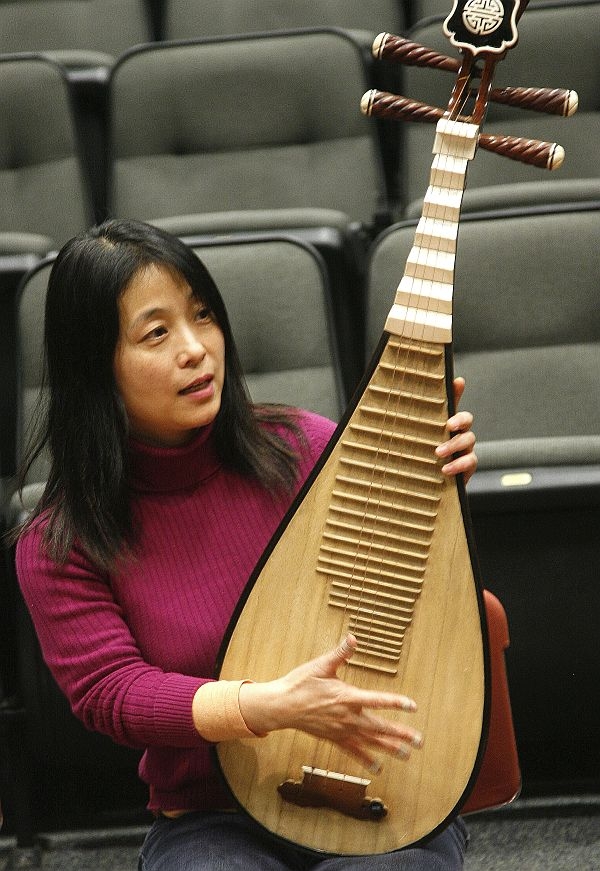
(Host) All this week, students at Dartmouth have been learning about the pipa, a Chinese lute that dates back 2,000 years. Their teacher, named Wu Man, is a renowned modern performer. She’s preserving the pipa’s traditional repertoire and collaborating with famous contemporary composers and musicians.
Wu Man performs Friday night at the Hopkins Center. VPR’s Charlottte Albright spoke with her before she taught a class.
(Albright) As a girl growing up in Communist China, Wu Man didn’t ask to play the pipa. Like almost everything in her young life, it was chosen for her by her parents, in part, she jokes, to make sure she practiced long hours indoors and stayed out of trouble.
For a few years she struggled to master the heavy lute with five tall frets-a challenge for tiny fingers. But by the time she was twelve, she says she had fallen in love with it.
(Wu Man) "Wow. This 2,000 year old culture is part of my, I think it’s, it’s inside of me. So to me it’s very natural to use this instrument to express myself, use this kind of language, this sound."
(Albright) Her modern pipa is about as big as a guitar. There is no hole in the four-stringed, pear-shaped body. Sound resonates, instead, through soft wood in front and hard rosewood in the rounded back. And hers is embellished with a delicate painting of two young girls at play.
(Wu Man) "That’s the tuning, that’s four strings. And the difference is the language. The musical vocabulary is very different from other lute or guitar or banjo. Slightly like a banjo-a lot of bended notes on the left hand."
(Albright) In 2010, Wu Man traveled with Dartmouth Musicology Professor Ted Levin to the birthplace of the pipa in the remote borderlands of western China. Levin says Wu Man was the ambassador for a delicate musical mission sponsored by the Smithsonian Folklife Center and the Aga Khan Trust for Culture.
(Levin) "We went to Wu Man because we wanted to work with Uyhghur musicians from the west of China but to do it in a way that wouldn’t call attention to itself as a political project because it’s no secret that there are very sensitive political relations now between the Uyghur minority in the west of China and the Han majority."
(Albright) Here’s an excerpt from the soon-to-be-released CD created on that trip:
(Wu Man) "Much beautiful setting, with trees, with birds, with sitting on the bench and in the morning we just-they bring awesome fruits from their village and we started rehearsal, we started learning, started talking. It was quite moment in my memory, yeah."
(Albright) Wu Man is building bridges not just between centuries, but between Eastern and Western traditions. When she plays songs composed for her by minimalists like Phillip Glass, or performs with Yo Yo Ma’s Silk Road ensemble, her pipa can make a strangely modern sound.
 (Wu Man) "Yeah, try Chinese blues."
(Wu Man) "Yeah, try Chinese blues."
(Albright) All this week, Woo Man has been teaching at Dartmouth with Professor Levin. As students take their seats in a circle, Wu Man fields questions about the pipa and about her training in China.
Prodigies like her were expected to attend a professional music conservatory at government expense.
About twenty years ago, Wu Man emigrated to America to soak up more western music, and to bring her talents here. At the end of the class, Janet Hong, whose heritage is Korean, ponders the growing popularity of the quiet, often plaintive pipa.
(Hong) "I think in today’s fast-paced society we might be going to the basics, and it’s a very subtle instrument and even in its subtlety it’s beautiful, and that’s its attraction."
(Albright) Janet Hong says she’s so enthralled she plans to download Woo Mon’s new CD on to her i-Phone.
For VPR News, I’m Charlotte Albright.
(Host) Wu Man will perform with others at Dartmouth’s Spaulding Auditorium Friday night at 8:00 p.m.